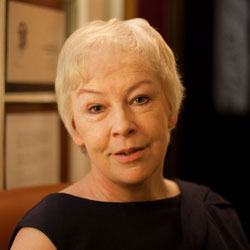It sits with itself in its arms. Out of
the depth of its shame it starts singing
a hymn of pure shame, surging in the throat.
To hold a true note could be everything.
Getting the hang of itself would undo it.
Notes on the Poem
In just four lines, Denise Riley encapsulates her fascination with lyric poetry and lyrics and opens floodgates of provocative thought about what constitutes poetry. There is much to delve into and many directions in which to head from the starting point offered by this selection from her 2017 Griffin Poetry Prize shortlisted collection Say Something Back. We can thank editor Peter Riley of The Fortnightly Review for performing extensive yeoman's work on the questions and conundrums posed by Denise Riley's poem. The focus of his examination is clear, as his very detailed review of Say Something Back opens with: "THE WORD LYRIC has hovered round Denise Riley’s poetry for as long as I can remember ..." From the start, "An awkward lyric" is obviously tussling with the value of lyrical expression, suggesting with "It sits with itself in its arms." that it is the ultimate in solipsism and self-absorption. As Peter Riley tussles with "a nineteenth-century divisive and mistaken re-definition which says that lyrical poetry is not a formal category at all but 'the expression by the poet of his own feelings'", he also points out that:"Lyric cannot at the same time be direct transmission of the author’s own “thoughts and sentiments”, and the highly impersonal work involved in close attention to the formalities, the metrical and phonetic events involved in fitting words to music or assuring a recognisably song-like writing. It seems more likely that lyric is not a kind of poetry at all, but a poetical technique. The purpose of the technique is to create an illusion of song."Representative of what Denise Riley grapples with throughout the collection, feelings are decidedly paramount in what follows the opening line of this poem: "Out of the depth of its shame it starts singing a hymn of pure shame, surging in the throat." ... yet there is still the quandary of whether or not this is admissible as poetry, so much so that the sentence repeats the word "shame". Notably, the longest poem in this collection is "A Part Song", in which the poet confronts and struggles with the loss of her son. Again, as the Griffin Poetry Prize judges observe, she continues to question what form of expression is possibly adequate: "In it she addresses poetry itself and questions its ability to give appropriate form to such loss." Riley the poetry editor's musings on Riley the poet's work can lead us further along to the wide and ongoing discussion of whether or not what is expressed in song lyrics can and should be considered poetry. Sparked again in earnest by Bob Dylan's Nobel Prize, we get to revisit Simon Armitage's contentions on the subject:"Songwriters are not poets. Or songs are not poems, I should say. In fact, songs are often bad poems. Take the music away and what you're left with is often an awkward piece of creative writing full of lumpy syllables, cheesy rhymes, exhausted cliches and mixed metaphors."Arguably, this crisp line ... "To hold a true note could be everything." refutes that this brief poem is or contains an awkward lyric, and equally redeems lyric as something much more than sappy or undisciplined. At the same time, the yearning of "could be" and the sweep of "everything" undeniably hold the poet's feelings. And then ... "Getting the hang of itself would undo it." again, crisply stated, holds within it yet another conundrum, questioning if refining the form of expression would "undo" its emotional profundity. Perhaps that Denise Riley is able to pack so much in and provoke so much thought in so few lines proves that this is far from an awkward lyric.
